SUE TURNER is fascinated by a book that researches who the largely immigrant workforce were that built the Empire State
LEO BOIX reviews a caustic novel of resistance and womanhood by Buenos Aires-born Lucia Lijtmaer, and an electrifying poetry collection by Chilean Vicente Huidobro


CAUTERY, as defined by the Oxford English Dictionary, is the act of burning tissue — whether with flame, chemicals or electric current — to stop it bleeding or to destroy.
It’s a method of searing, a violent healing. That’s precisely the sensation Lucia Lijtmaer conjures in her blistering debut novel Cautery (Charco Press, £11.99) — a searing, time-skipping tale of heartbreak, resistance and womanhood.
Lijtmaer weaves together two electrifying narratives: the raw, darkly comic fallout of a modern break-up in Barcelona, and the solemn, harrowing journey of Deborah Moody, a 17th century Englishwoman who dares to defy patriarchal religious order in Massachusetts.
These two stories, centuries apart, collide in unexpected and explosive ways.
“I just want to kill myself,” the contemporary narrator begins, unapologetically bleak and sharply self-aware. Dumped by her boyfriend — a politician in the making — she spirals into fantasies of apocalypse, drowning cities and delicious ruin.
Barcelona, in her hands, is no tourist postcard. It’s a city on the brink: gentrified, alienating and emotionally suffocating.
Her voice flickers between hilarity and despair, prophecy and profanity, always keeping the reader slightly off-balance.
In contrast, the historical strand follows Deborah Moody as she escapes a stifling London and sails to the New World. There, she befriends the magnetic Anne Hutchinson, a woman whose defiance of Puritanical authority proves fatal.
Their story unfolds with a quiet intensity, steeped in persecution, mysticism and buried rage.
Lijtmaer masterfully alternates these narratives, weaving them with language that bites — witty, ironic and often brutal — yet steeped in careful historical detail. When the two threads finally entwine, the effect is visceral.
Cautery marks a bold, unforgettable debut. With this novel, the Buenos Aires–born Lijtmaer announces herself as a literary force — one who writes with both fire and precision.
“That there falling from the trees / Is the night / The sea in my brandy glass / And on the sea / your vertical hat / WHERE ARE YOU FOREVER GOING / Someone has died in your garden…” So begins the surreal, shimmering world of Vicente Huidobro’s poem Cigar, a line that perfectly captures the electrifying energy of Arctic Poems (Shearsman Books, £12.95).
Translated with razor-sharp precision by Tony Frazer — perhaps the foremost authority on Huidobro’s work in Britain and beyond — this collection is a blast of cold, poetic fire.
Initially published in Madrid in 1918 as Poemas Articos, the book is dedicated to Cubist titans Juan Gris and Jacques Lipchitz. That dedication isn’t just a nod — it sets the tone for the entire collection: fragmented, experimental and pulsating with the rhythms of Modernism.
Here, images break apart like ice floes and reform into haunting and absurd visions. The shadow of the WWI looms throughout: “The troops alight / in the dead of night / In battle the soldiers forgot their names / Beneath that conical smoke / The train moves off like a telephone call,” he writes in Station, a chilling dispatch from the trenches of fractured identity.
Frazer’s illuminating introduction guides readers through this kaleidoscopic landscape, tracing Huidobro’s shift from Symbolist whisperings to the raw, crackling charge of European avant-garde.
Arctic Poems isn’t just a historical artefact — it’s a living, breathing force of poetic innovation. Dazzling, disorienting and defiantly original, this collection is a must-read for anyone interested in the wild frontiers of 20th century poetry.










